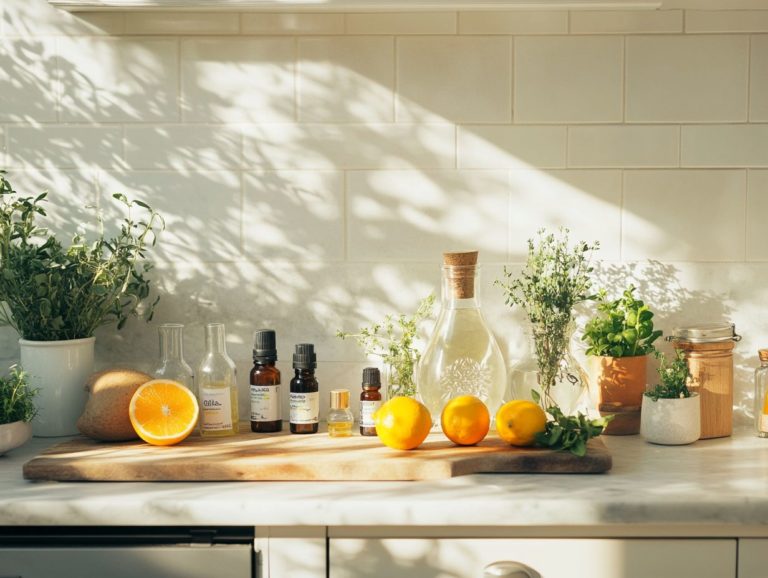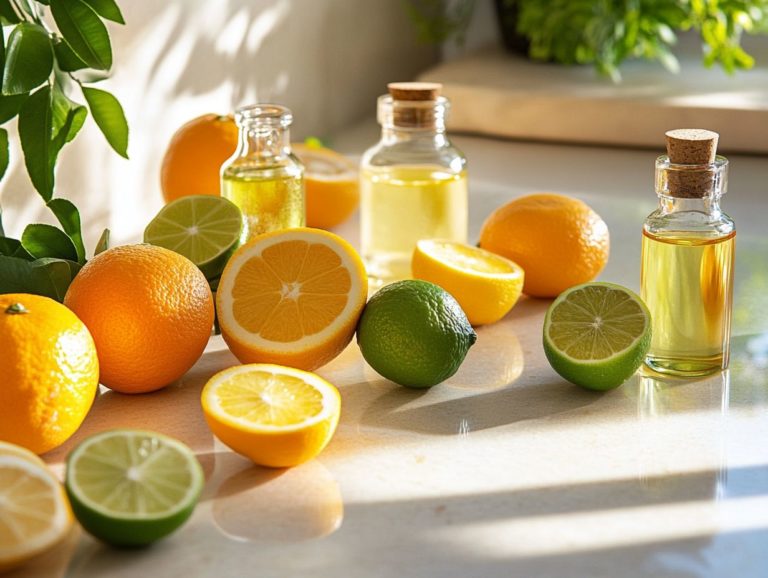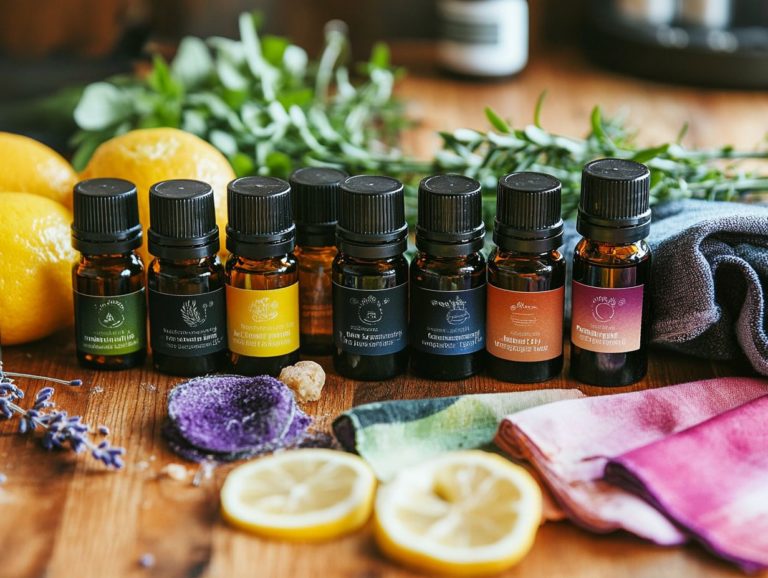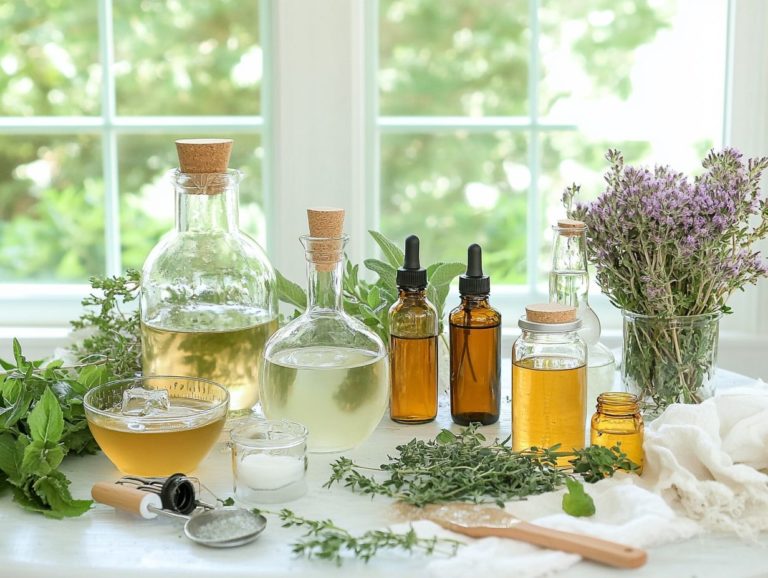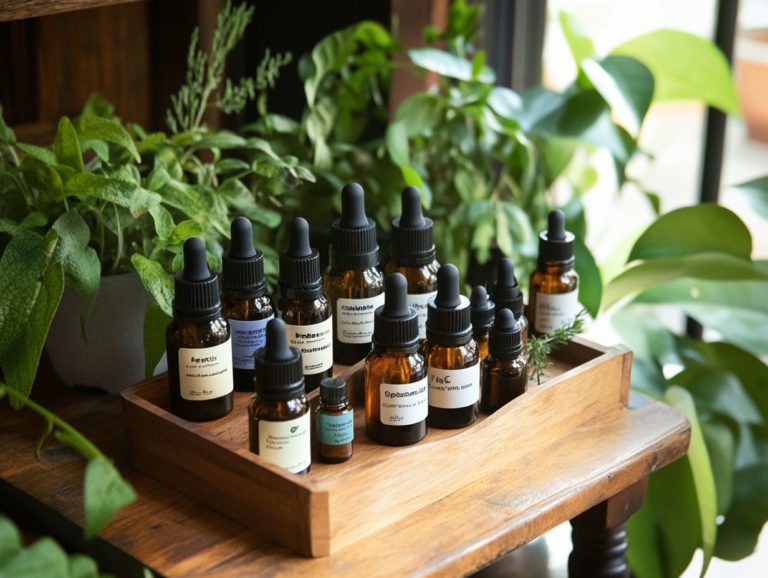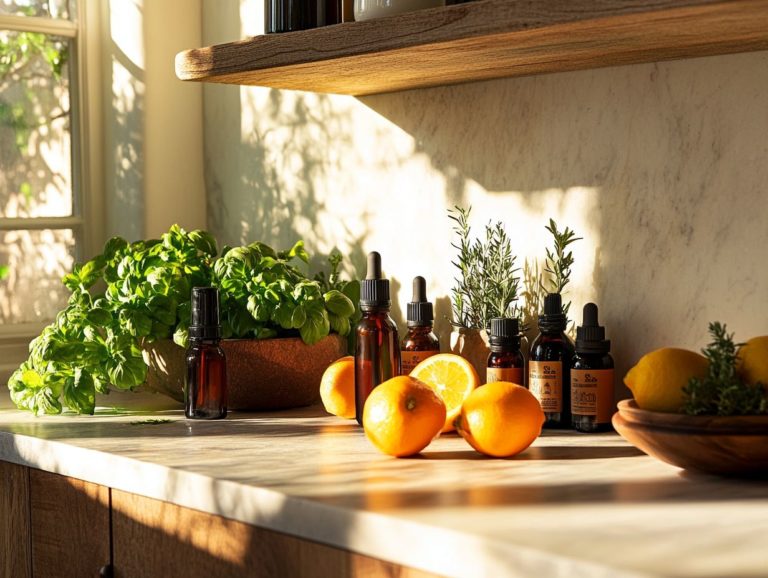The Importance of Dilution in Essential Oil Cleaning
Essential oils have emerged as a favored choice for those seeking natural cleaning agents. They provide a fragrant and effective alternative to traditional products.
To use them safely, it s crucial to understand the importance of dilution. This vital step enhances their benefits while reducing potential risks.
Let s explore what essential oils are and how they can transform your cleaning routine!
This article discusses the significance of proper dilution, the best oils for cleaning, and practical applications. It also addresses essential safety precautions to ensure that your cleaning experience is both safe and effective.
Discover how you can harness the power of essential oils to create a cleaner, fresher home.
Contents
- Key Takeaways:
- What Are Essential Oils?
- What Is Dilution?
- Why Is Dilution Important in Essential Oil Cleaning?
- How To Dilute Essential Oils For Cleaning Purposes?
- What Are The Best Essential Oils For Cleaning?
- What Are The Different Ways To Use Diluted Essential Oils For Cleaning?
- Are There Any Safety Precautions To Take When Using Diluted Essential Oils For Cleaning?
- Essential Oils and Their Applications
- Frequently Asked Questions
- What is the importance of dilution in essential oil cleaning?
- How does dilution affect the cleaning properties of essential oils?
- What are some common carrier oils used for dilution in essential oil cleaning?
- Is it necessary to dilute every essential oil used for cleaning?
- How do I determine the proper dilution ratio for essential oil cleaning?
- Can I use essential oils without diluting them for cleaning purposes?
Key Takeaways:
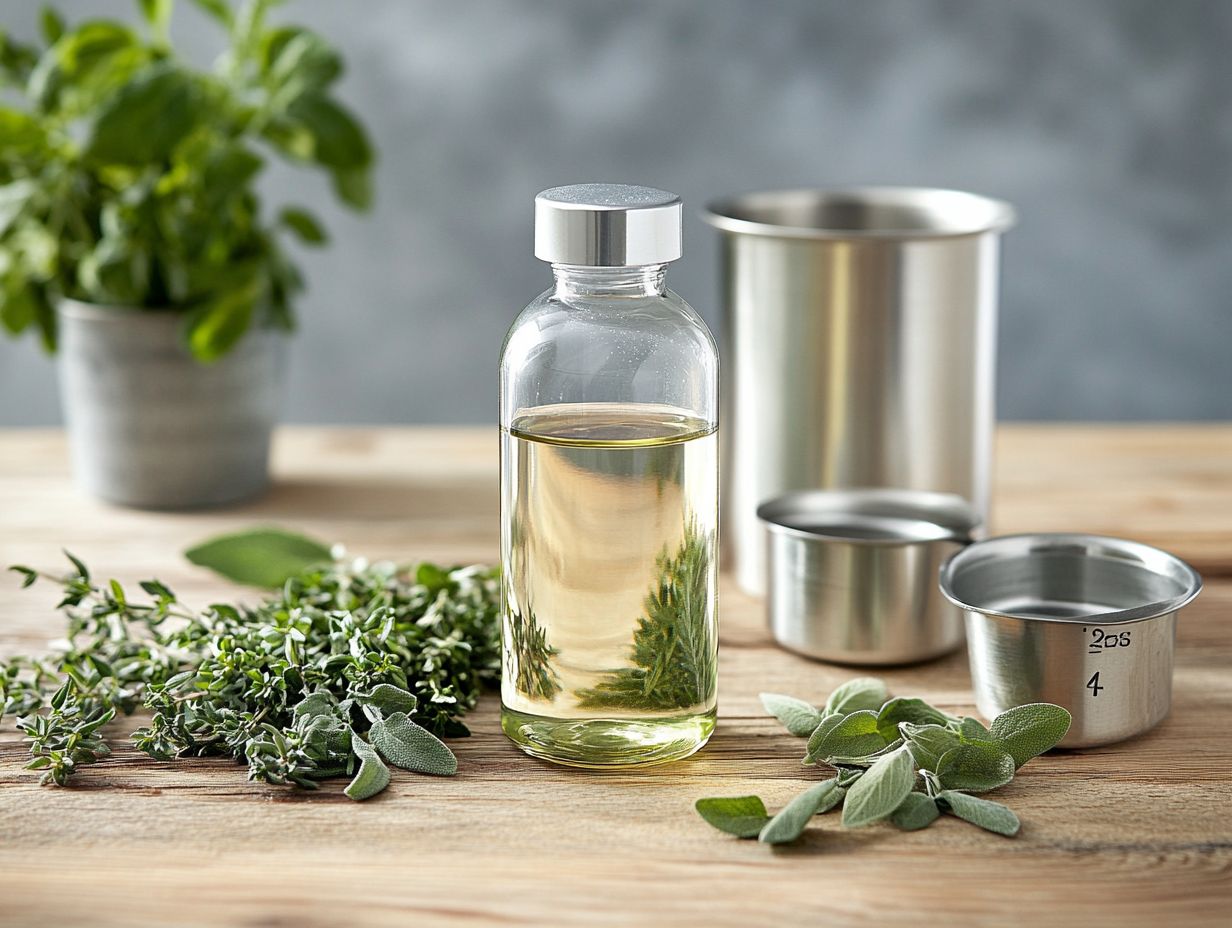
- Dilution is crucial for safety and maximizing benefits.
- Lemon, tea tree, and lavender are some of the best oils for cleaning.
- You can use diluted essential oils in many ways, like an all-purpose cleaner or disinfectant spray.
What Are Essential Oils?
Essential oils are concentrated extracts from plants that capture the powerful properties and delightful aromas of flowers, herbs, and more. They are derived through methods like steam distillation or cold pressing. These organic oils have been treasured for centuries for their myriad health benefits and applications in cleaning and aromatherapy.
You ll find favorites like lavender, revered for its calming effects, tea tree oil, celebrated for its antibacterial prowess, and eucalyptus, often sought after for its refreshing scent.
Whether you explore health food stores or browse online marketplaces like Amazon, a vast selection of essential oils awaits you, ready to enhance your wellness journey.
What Is Dilution?
Dilution involves the careful mixing of essential oils with a carrier oil. Carrier oils are neutral oils used to dilute essential oils and make them safe for skin application. This process reduces their concentration to enhance safety for topical applications and broaden their usability, including in cleaning.
Dilution is essential when using concentrated oils. It reduces health risks and ensures safe application. You ll find that common carrier oils like sweet almond oil and jojoba oil serve as excellent choices for diluting essential oils, whether for skin applications or as key ingredients in your DIY cleaning solutions.
Why Is Dilution Important in Essential Oil Cleaning?
Dilution is a crucial aspect of cleaning with essential oils. It not only boosts the effectiveness of your cleaning solutions but also places user safety at the forefront, thereby reducing health risks that can arise from using undiluted essential oils.
When you properly dilute essential oils, you retain their antibacterial and antiseptic properties, making them suitable for various cleaning tasks. For example, incorporating diluted lavender or tea tree oil into your homemade cleaners allows you to enjoy their delightful fragrance and health benefits while safeguarding your well-being and that of your pets.
What Are the Risks of Using Undiluted Essential Oils?
Using undiluted essential oils can invite a host of risks, including skin irritation, allergic reactions, and even potential toxicity especially when applied directly to your skin without necessary dilution. These health concerns highlight the critical importance of following essential oil safety guidelines, particularly for topical applications.
For instance, applying concentrated tea tree oil directly can trigger adverse reactions. It s crucial to dilute it properly with a carrier oil before use.
Certain oils, like clove and cinnamon, are notorious for their potent concentrations and can lead to burns or significant irritation upon contact. Even oils that are typically deemed safe, such as lavender and peppermint, can cause unexpected sensitivities in some individuals, emphasizing the importance of exercising caution.
Mixing essential oils with a carrier not only enhances safety but also boosts the overall efficacy of the oil. Thus, adhering to established safety practices, including patch testing and consulting professional guidelines, is essential to ensure that you use essential oils safely and effectively.
How To Dilute Essential Oils For Cleaning Purposes?
To effectively dilute essential oils for cleaning, blend concentrated essential oils with an appropriate carrier oil or other diluents in precise ratios. This careful process transforms powerful oils, such as lemon and grapefruit, into versatile elements of your DIY cleaning recipes. By harnessing their beneficial properties, you ensure safe application.
You can easily incorporate these oils by adding a few drops to a spray bottle filled with water. Alternatively, mix them with a carrier oil for use on surfaces. This simple trick transforms your cleaning routine into a refreshing experience while keeping safety at the forefront.
What Are The Recommended Dilution Ratios?
Essential oils recommended dilution ratios can vary based on the specific oil and its intended application. For cleaning, use about 10-15 drops of essential oil in a 16-ounce spray bottle filled with water. This ensures you effectively harness the potent properties of the essential oils while maximizing their health benefits.
A common guideline suggests mixing 1-2 drops of essential oil per teaspoon of carrier oil for topical uses or cleaning solutions. It s essential to consult mixing guides tailored to specific oils for safety and effectiveness.
For example, lavender oil is often diluted to a 2% ratio for general use, translating to roughly 12 drops per ounce of carrier oil. This makes it an ideal choice for calming massages or skin-soothing applications. Meanwhile, tea tree oil, celebrated for its antiseptic properties, is usually diluted to around 1% or about 6 drops per ounce of carrier oil, particularly for addressing skin irritations.
By adhering to these recommended dilution ratios, you enhance the therapeutic effects of the essential oils and minimize the risk of irritation or adverse reactions. This approach allows you to enjoy the full spectrum of their benefits in a safe and effective manner.
What Are The Best Essential Oils For Cleaning?
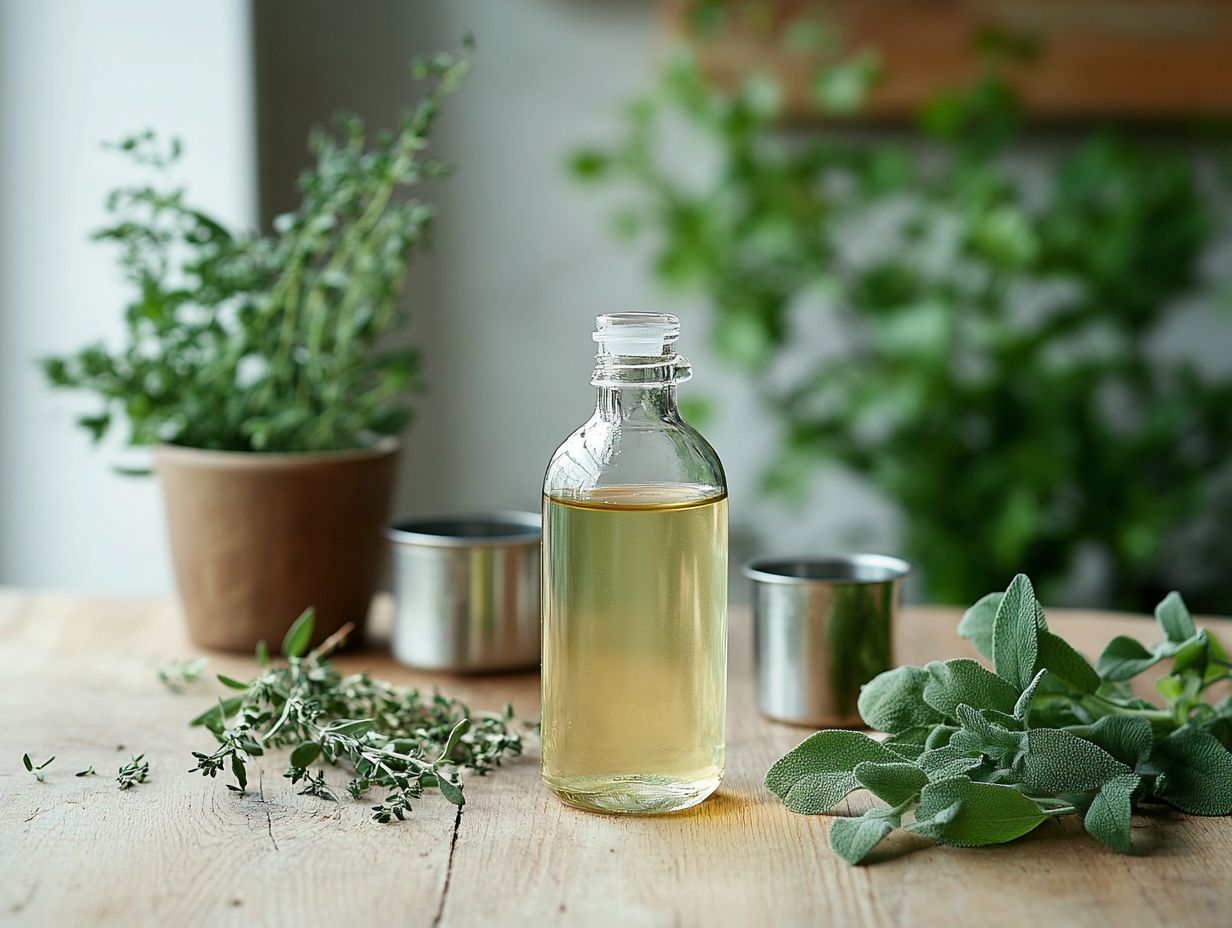
Essential oils have powerful cleaning properties. When choosing the finest essential oils for cleaning, select those that boast powerful properties and health benefits, ensuring they effectively eliminate germs while refreshing your space.
- Lemon essential oil: Celebrated for its invigorating aroma and antibacterial prowess.
- Tea tree oil: Known for its exceptional antiseptic qualities.
- Lavender essential oil: Cleans while infusing your environment with a calming scent.
- Eucalyptus essential oil: Appreciated for its refreshing attributes and odor-fighting capabilities.
- Grapefruit essential oil: Perfect companion for your cleaning endeavors.
1. Lemon Essential Oil
Lemon essential oil stands out as a formidable cleaning agent. It is known for its antibacterial properties and invigorating fragrance, making it a key ingredient in numerous DIY cleaning recipes. Its natural high acidity works wonders in breaking down grease and grime while leaving behind a delightful scent.
When diluted correctly, lemon essential oil is also safe to use around pets. This offers a practical solution for pet owners who wish to maintain a spotless home.
This essential oil not only tackles stubborn stains but also serves as a powerful natural disinfectant, celebrated for its effectiveness in eliminating harmful bacteria and viruses. When combined with vinegar or baking soda, you amplify the cleaning prowess of these everyday household staples, resulting in a potent solution for countertops, bathrooms, and kitchen surfaces.
In comparison to other essential oils, like tea tree or eucalyptus, lemon leaves a lighter, more uplifting aroma that many find more appealing for daily use. Whether you re freshening the air or sanitizing surfaces, incorporating lemon essential oil into your cleaning routine can significantly enhance both the efficacy and enjoyment of your household chores.
Try these oils today and feel the difference in your cleaning!
2. Tea Tree Essential Oil
Tea tree essential oil is renowned for its remarkable antibacterial and antiseptic qualities. It’s a superb choice for cleaning solutions that disinfect surfaces and banish unpleasant odors. This powerful oil targets a broad spectrum of germs and fungi, making it a popular natural cleaning alternative. When mixed with water, tea tree oil is safe to use around pets, helping maintain a clean and healthy home environment.
This versatile oil can significantly enhance your DIY cleaning recipes. For instance, mixing a few drops of tea tree oil with water and vinegar creates a formidable all-purpose cleaner that tackles greasy kitchen surfaces and bathroom fixtures alike. Combining it with baking soda creates a robust scrubbing paste, perfect for deodorizing carpets and removing stubborn stains. Tea tree oil’s antiseptic properties also make it a powerful addition to homemade cleaners.
These simple recipes allow you to make the most of tea tree oil’s benefits while providing an eco-friendly alternative to conventional cleaning products. You can clean your home with confidence and care for the environment, knowing that using organic essential oils keeps your cleaning products free from harmful chemicals.
3. Lavender Essential Oil
Lavender essential oil is celebrated for its calming effects and effectiveness in cleaning. Thanks to its natural germ-fighting abilities, it can transform your cleaning routines into aromatic experiences, elevating mundane tasks into moments of relaxation. When blended with other essential oils, like chamomile and rosemary, lavender enhances the scent of your cleaning products while offering added health benefits.
As a powerful disinfectant, lavender is excellent for maintaining a pristine home. Incorporating lavender into your sprays and household cleaners helps keep surfaces germ-free while filling the air with its soothing fragrance. Whether you’re cleaning the kitchen or sprucing up the bathroom, using lavender in your daily routine not only uplifts your mood but also ensures effective sanitation.
Adding lavender essential oil to your cleaning regimen promotes a holistic approach to health and home care. Every cleaning session becomes a step toward wellness. By incorporating essential oils into your routine, you enhance both your home environment and your overall well-being.
What Are The Different Ways To Use Diluted Essential Oils For Cleaning?
Cleaning with diluted essential oils not only freshens your home but also offers aromatherapy benefits, creating a more pleasant environment.
You have many options for using diluted essential oils for cleaning. This versatility and effectiveness help maintain a pristine environment. Whether crafting all-purpose cleaners, disinfectant sprays, or laundry enhancers, essential oils can easily fit into a range of cleaning solutions tailored to your needs.
For example, blending eucalyptus essential oil with vinegar creates a natural disinfectant spray. Adding lavender oil infuses your laundry with a soothing aroma, ensuring both freshness and hygiene. You can find these pure essential oils at your local health food store or online platforms like Amazon.
1. All-Purpose Cleaner
Create a homemade cleaner with essential oils to suit your needs.
An all-purpose cleaner made with essential oils tackles everyday messes. Blend oils like lemon, tea tree, and lavender with water and vinegar for a powerful solution that disinfects and smells great.
Start with equal parts vinegar and water. Then, add 10-15 drops of your chosen essential oils to boost the cleaner’s antimicrobial properties.
Lemon oil cuts through grease and smells uplifting. Tea tree oil is known for its strong antibacterial qualities, while lavender brings a calming scent.
Mix these ingredients in a spray bottle and shake well before each use. Brands like Aura Cacia and Now offer a range of oils perfect for DIY cleaning.
2. Disinfectant Spray
Research shows that adding essential oils to cleaners boosts their disinfectant properties.
An essential oil disinfectant spray is your best defense against germs on surfaces, especially in kitchens and bathrooms. Blend oils like tea tree and eucalyptus with vinegar or alcohol to create a powerful disinfectant.
To make this natural disinfectant, use a clean spray bottle that holds at least 16 ounces. Combine one cup of distilled water with half a cup of white vinegar.
Add about 10 drops of tea tree oil and eucalyptus oil, both known for their disinfecting abilities. Cap the bottle tightly and shake well to mix everything.
Shake before each use and spray on surfaces. Allow it to sit for a few minutes before wiping for the best results.
3. Laundry Enhancer
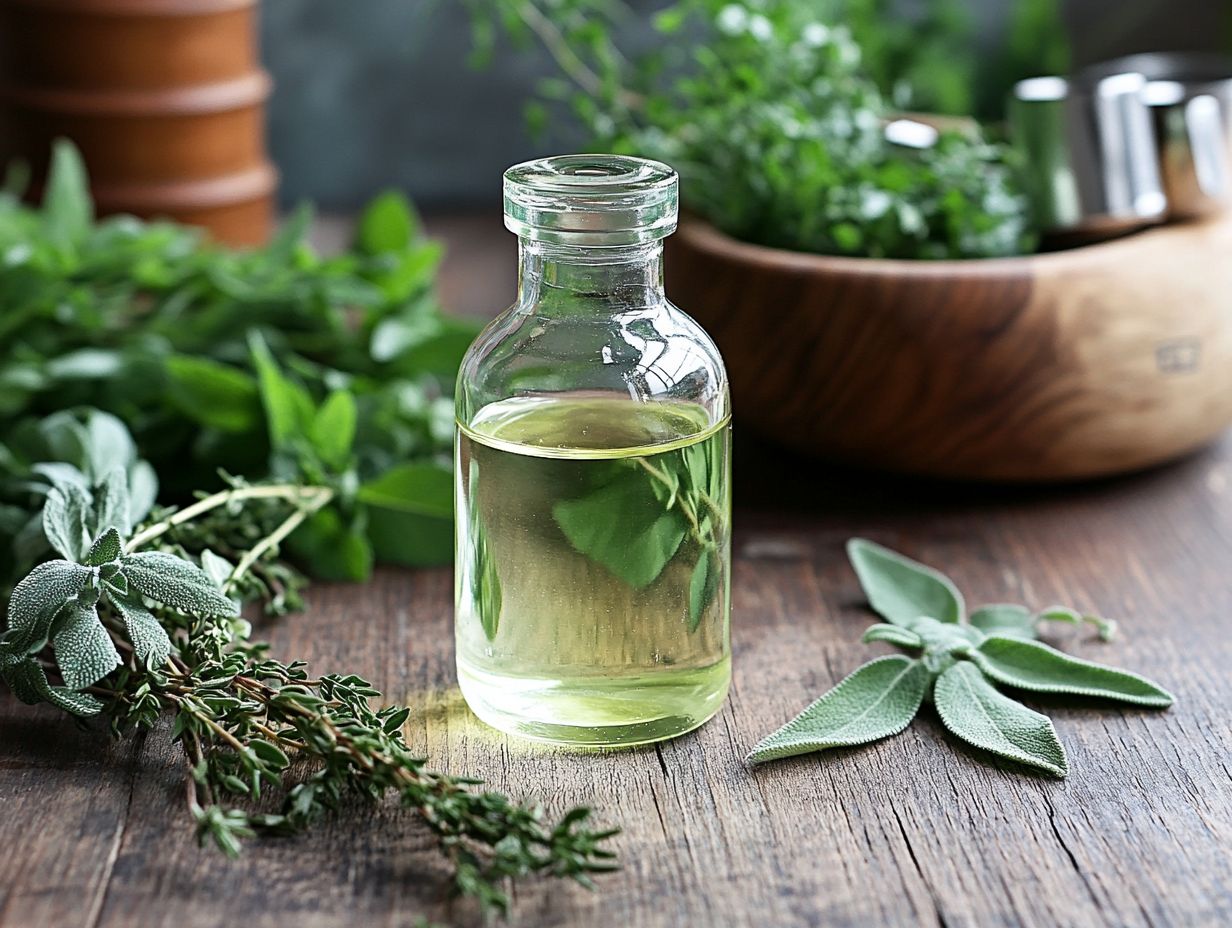
Adding essential oils to your laundry routine can transform your cleaning products into powerful tools for both cleanliness and aromatherapy.
Incorporating essential oils into your laundry routine can elevate the freshness of your clothes while offering added antibacterial benefits.
Imagine adding a few drops of lavender or grapefruit during the rinse cycle, or mixing them with baking soda to create a natural laundry booster.
This delightful addition ensures your clothes smell fantastic and combats stubborn odors, transforming your laundry day into a sensory delight. It s a simple yet effective way to promote a healthier washing environment. Using pure essential oils ensures that your laundry is free from synthetic fragrances and chemicals.
To truly harness the power of essential oils, you might want to experiment with different varieties. For instance, tea tree oil is renowned for its strong germ-fighting abilities, while eucalyptus brings an invigorating scent that can invigorate your senses. A few drops can be blended with your regular detergent or used in a DIY fabric softener recipe. By incorporating these oils, they can also help reduce allergens and irritants, making this approach especially beneficial for family members with sensitivities. Opting for popular brands like Aura Cacia or Now ensures you are using high-quality, concentrated oils.
By thoughtfully selecting and using essential oils, you can elevate your laundry ritual into a complete cleaning experience that nourishes both your clothes and your home. Essential oil combinations tailored to your needs can make a significant difference in the effectiveness of your cleaning solutions.
Are There Any Safety Precautions To Take When Using Diluted Essential Oils For Cleaning?
When incorporating concentrated oils into your cleaning regimen, following essential oil safety guidelines is crucial to avoid potential health concerns.
When you opt for diluted essential oils in your cleaning routine, it s essential to embrace specific safety measures to ensure a secure and effective experience. Start by conducting a patch test to avoid surprises before using it extensively. Consulting a guide for essential oils can provide helpful guidelines on dilution and usage.
Be mindful to steer clear of your eyes and any sensitive areas, as these oils can be potent. Proper storage is key; make sure to keep your oils in a safe place, well out of reach of children and pets. Opting for steam distillation ensures you are using pure essential oils, free from contaminants.
Opt for pet-safe oils and adhere to the recommended dilution guidelines to minimize any potential health risks. Your cleaning can be both effective and safe with just a bit of precaution. Always use essential oils around pets with care to avoid any health concerns.
1. Patch Test Before Use
Essential oil safety is paramount when incorporating these potent properties into your routine.
Performing a patch test before using diluted essential oils is a crucial step to determine your skin’s sensitivity and avoid potential allergic reactions. This simple test requires applying a small amount of diluted oil to a discreet area of your skin, allowing you to monitor for any adverse reactions, such as redness or irritation. By conducting a patch test, you can safely enjoy essential oils without worrying about skin irritation during cleaning.
This practice enables you to make informed choices about your skincare routine, especially if you have sensitive skin or allergies.
To conduct a patch test effectively, begin by selecting a small area on your inner forearm or behind your ear, as these spots are less visible and more sensitive. Using a carrier oil like sweet almond oil helps to dilute the essential oil for safe application.
Dilute the essential oil with a carrier oil, applying no more than a dime-sized amount. Cover the area with a bandage and wait 24 hours to observe for any reactions. If you experience no irritation, you can generally consider the essential oil safe for further use.
This precaution enhances your safety and boosts your confidence, letting you dive into using essential oils with excitement!
2. Avoid Contact With Eyes And Sensitive Areas
When using diluted essential oils, avoid contact with your eyes and sensitive areas. This helps prevent irritation and discomfort.
Even diluted essential oils can sting if they touch sensitive skin or broken skin. Exercise caution when applying cleaning solutions to minimize the risk of accidental splashes. Proper essential oil concentration is key to avoiding these issues.
Certain oils, like peppermint and cinnamon, are especially known for their potential to irritate delicate skin or eyes, so it s vital to handle them thoughtfully. Avoid applying these oils directly to open cuts or abrasions, as this can worsen any irritation. To ensure a safe application, consider performing a patch test on a small area before going all in. Popular brands like Melaleuca and AromaForce offer essential oils that are often recommended for their quality and safety standards.
Using carrier oils like coconut, jojoba, or sweet almond oil is a smart move! These oils dilute the potency of essential oils and make your experience much safer. This process is essential for topical applications and aromatherapy to ensure safe practices.
3. Keep Out Of Reach Of Children And Pets
Ensuring that essential oils and cleaning solutions are kept out of reach of children and pets is a crucial safety measure, protecting against accidental ingestion or exposure to concentrated oils. Many essential oils can pose health concerns if ingested or improperly applied, making it essential for you to store them securely in cabinets or containers that aren’t easily accessible.
Educating your family members about the proper handling of these products will further enhance safety in your home.
Consider designating a specific storage area that is high up and out of reach of curious hands and paws, as even small amounts of certain oils can lead to adverse reactions. Using childproof caps and clear labels can help prevent any mishaps. Keeping essential oils out of sight helps discourage curiosity.
Remember, pets can also be sensitive to these substances, so ensuring these oils are stored in a secure location will create a safer environment for everyone in your household. Pet-safe oils should be used to avoid any harmful effects on animals.
4. Store Properly
Store essential oils properly in a cool, dark place. This preserves their potency and ensures safety in your cleaning applications. Keep your oils away from direct sunlight and heat, as these elements can degrade their quality and effectiveness over time. Make sure the lids are tightly sealed; this simple step can prevent oxidation and extend the shelf life of your oils, allowing for safe use in your DIY cleaning solutions.
To further enhance their longevity, consider storing your essential oils in dark glass bottles, which shield the contents from ultraviolet light. This straightforward yet effective method helps avoid chemical reactions that could compromise the oils properties. Additionally, using organic essential oils can ensure you are working with high-quality, pure products.
It’s also essential to avoid frequent temperature fluctuations; maintaining a stable environment is key to preserving their aromatic qualities. Keeping your oils separate from highly scented products can prevent cross-contamination, ensuring you experience the purest essence possible. Various essential oil brands offer storage tips to maximize the oils’ potent properties.
By adhering to these best practices, you can prolong the life of your essential oils and maximize their benefits in a variety of cleaning and therapeutic applications. Consider incorporating oils like lavender, tea tree oil, eucalyptus, and grapefruit in your routines for their antibacterial properties and health benefits.
Essential Oils and Their Applications
Essential oils offer exciting uses beyond just cleaning! They are popular in aromatherapy for their aromatic experiences and health benefits. Brands like Aura Cacia and Now provide a wide range of oils that can be used in scent diffusers and other applications. Some oils, such as Melaleuca (tea tree oil) and Bergamot, are known for their antibacterial properties. Always consult essential oil research and use reliable essential oil brands to ensure the quality and safety of your oils.
Frequently Asked Questions
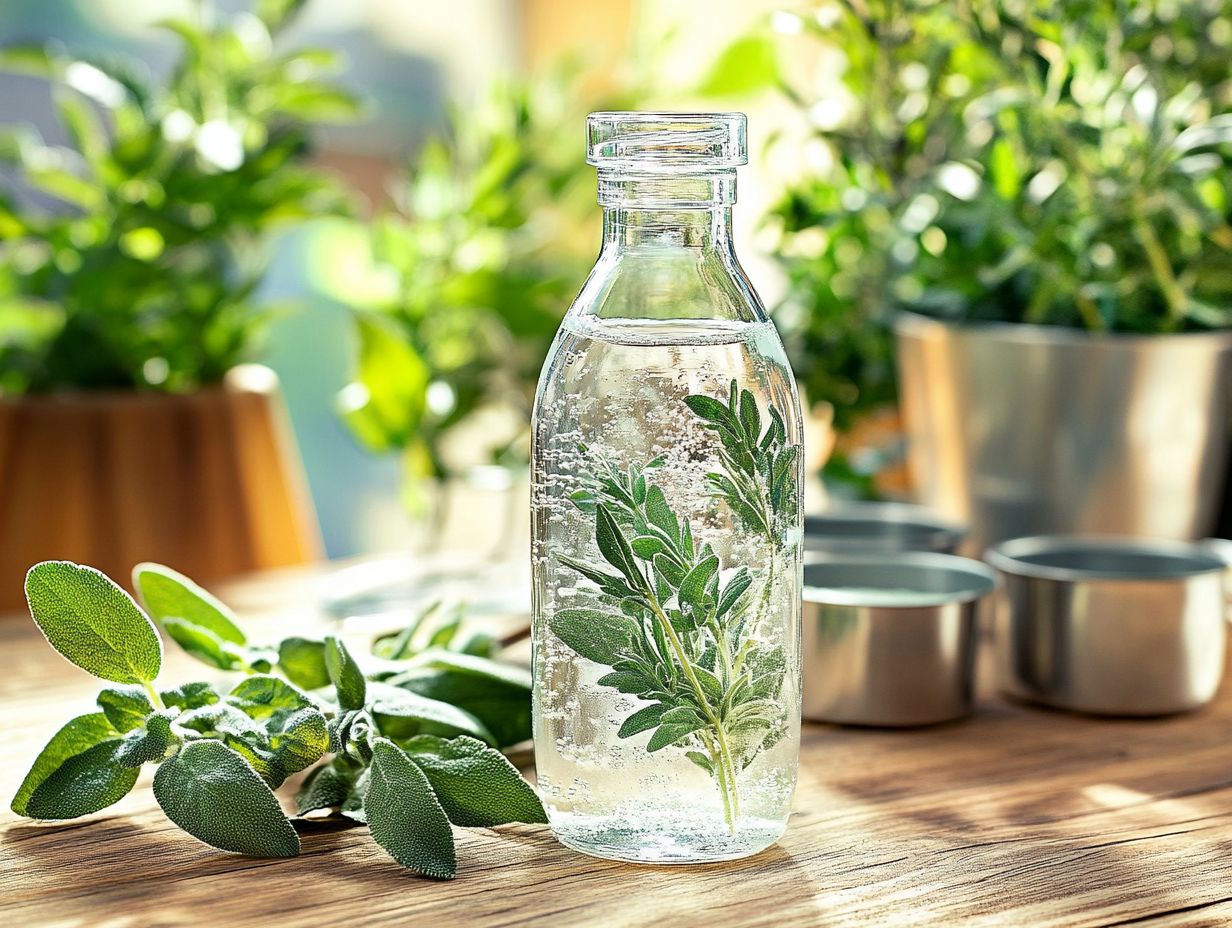
What is the importance of dilution in essential oil cleaning?
Dilution is essential in essential oil cleaning because pure essential oils are highly concentrated and can cause skin irritation or even chemical burns if applied directly to the skin. By diluting them in a neutral oil or water, you ensure safe and effective use. This is particularly important for DIY cleaning recipes.
How does dilution affect the cleaning properties of essential oils?
Dilution does not affect the cleaning properties of essential oils. In fact, it can improve their effectiveness by allowing them to spread more evenly and fully cover the surface being cleaned. By using a spray bottle, you can apply your homemade cleaner evenly to various surfaces.
What are some common carrier oils used for dilution in essential oil cleaning?
Some common carrier oils used for dilution in essential oil cleaning include coconut oil, almond oil, jojoba oil, and olive oil. These oils benefit the skin and help disperse the essential oils evenly. You can purchase these carrier oils at your local health food store or online retailers like Amazon.
Is it necessary to dilute every essential oil used for cleaning?
Yes, it is necessary to dilute every essential oil used for cleaning. Even mild essential oils, such as lavender or tea tree, should be diluted to avoid potential skin irritation. This is crucial for ensuring safe use and preventing skin irritation while utilizing the essential oils’ antiseptic properties.
How do I determine the proper dilution ratio for essential oil cleaning?
The proper dilution ratio for essential oil cleaning is typically 1-2% for adults and 0.5-1% for children or those with sensitive skin. This means adding 1-2 drops of essential oil per teaspoon of neutral oil or water. Refer to an essential oil chart for precise dilution guidelines.
Can I use essential oils without diluting them for cleaning purposes?
No, it is not recommended to use undiluted essential oils for cleaning. Even though they are natural, they are highly concentrated and can cause skin irritation or allergic reactions. Diluting them is necessary for safe and effective use. Many essential oil recipes guide you on proper dilution methods.
Explore essential oil recipes and products to enhance your cleaning routine with safety in mind!

